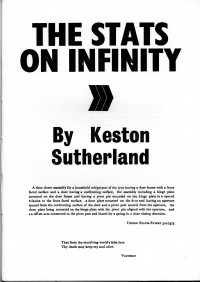“Here, the obsolete game-as-medium lights its fires with the levity of camp. Its “new aesthetic” texture makes a tragicomic figure for contemporary poetry: an anachronistic genre of gaming while Rome burns—or dreaming Rome might burn, while in fact the empire goes on using stuff up outside as usual, pleasant or painful, awful but cheerful, the deflector shield quite operational when your friends arrive.” — David Gorin at the Boston Review considers the perverse negativity of those crud-ducks over at Claudius App, whose reading this Saturday 9/21 @ 9PM @ Reena Spaulings with Geoffrey G. O’Brien, Ariana Reines, and Keston Sutherland
you should definitely avoid, because just look at this animated GIF below they made for it that links directly to the Facebook event, which supposedly 118 people are going to, and look, I’ve been to Brooklyn, 118 people don’t even live in that pie shop, so, yeah, sure, keep murdering your brother, Claudius, it’s not like we don’t all know he’s the real king, and it’s not like we’re not going to keep putting slippers on your hands so you rub your eyes with your slippers when you wake up:
The Stats on Infinity
 The Stats on Infinity
The Stats on Infinity
by Keston Sutherland
Crater Press, 2010
15 pages / Out of Print
Rating: 8.0
I don’t know how familiar readers of this site will be with the work of Keston Sutherland, the British experimental poet sometimes associated with the Cambridge and New York “LANGUAGE” schools of poetry (though Sutherland’s work squirms uneasily under any attempt at definition in terms of school/genre/whatever). Sutherland’s poetry is difficult. A video of Sutherland reading his long poem Hot White Andy is a good introduction to his work: intense, surging and bewildering. He looks manic as he reads; the text is plosive and works through him, as though it is spilling out of his body rather than his mind, like Lucky’s monologue in Waiting for Godot, or the frenetic mutterings of Not I.
September 20th, 2011 / 1:09 pm

